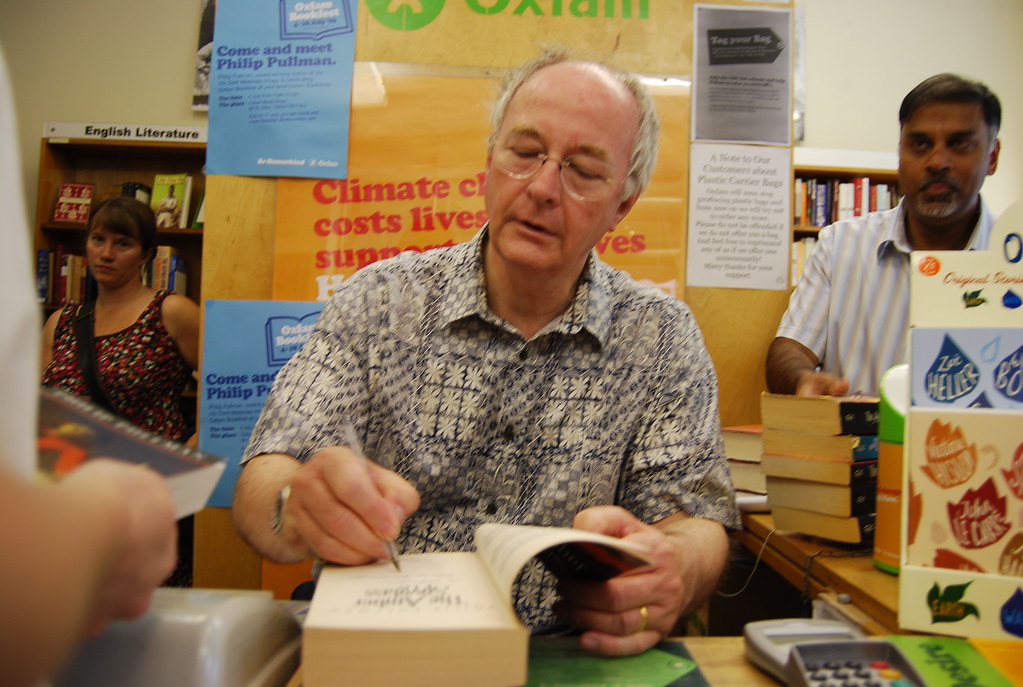Philip Pullman was born in Norwich, England, in 1946, receiving his childhood education in England, Zimbabwe, and Australia before his family settled in the Australian state of New South Wales. Pullman received his university education at Exeter College, Oxford, in English, becoming a teacher at the age of 25. Pullman taught at various Middle Schools in Oxford before spending eight years teaching at Westminster College, starting when Pullman was forty, in 1986 (Thornes).
Pullman published his first children’s book, Count Karlstein, in 1982, being subsequently reprinted in 2002. Next, Pullman wrote a four book series centered upon a young Victorian adventurer Sally Lockhart, the first of which was The Ruby in the Smoke, published in 1986. Additionally, Pullman wrote several shorter stories which he refers to on his website as “fairy tales,” for a supposed lack of a better word (Thornes).

Pullman started publishing his best-known trilogy, His Dark Materials, in 1995, starting with the novel Northern Lights, or The Golden Compass in North America. This series, and especially its first book is, of course, the topic of this website. The trilogy’s two other works, The Subtle Knife and The Amber Spyglass, were published in 1997 and 2000, respectively. This trilogy has one many awards, such as “the Carnegie Medal, the Guardian Children’s Book Award, and (for The Amber Spyglass) the Whitbread Book of the Year Award.” The fact that The Amber Spyglass was the first children’s book to win the Whitbread award is especially notable (Thornes).
Pullman won the Eleanor Farjeon Award for children’s literature, the Astrid Lindgren Award (alongside Ryoji Arai), and even the Carnegie of Carnegies, for being the reader-chosen best book to win the original Carnegie Medal in its then-seventy years of existence (Thornes).
Pullman is also known for his strongly atheistic views, and has caused quite a bit of controversy around himself and his works with comments such as “I hope the wretched Catholic church will vanish entirely,” which, while stated after the incident this website is concerned with, have been a primary factor in religious objections to Pullman’s writings (Barton). Here are some other Pullman quotes, which contributed to the censorship of The Golden Compass:
“My books are about killing God.” (Sydney Morning Herald December 2003)
“I’m trying to undermine the basis of Christian belief… I’m not in the business of offending people. I find the books upholding certain values that I think are important, such as life is immensely valuable and this world is an extraordinarily beautiful place.” (Washington Post February 2001)
“[I]n my view, belief in God seems to be a very good excuse, on the part of those who claim to believe, for doing many wicked things that they wouldn’t feel justified in doing without such a belief.” (The Guardian February 2002)
Sources Cited:
Barton, Laura. “Philip Pullman: ‘I Hope the Wretched Catholic Church Will Vanish Entirely’.” The Guardian, Guardian News and Media, 19 Apr. 2010, www.theguardian.com/books/2010/apr/19/philip-pullman-interview-catholic-church.
“Philip Pullman Quotes (Author of The Golden Compass).” Goodreads.
Thornes, Robin. “About.” Philip Pullman, www.philip-pullman.com/about.